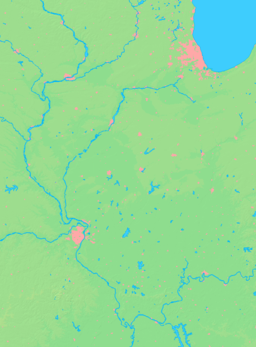- Colchester, Illinois
-
Colchester City Country United States State Illinois County McDonough Coordinates 40°25′31″N 90°47′32″W / 40.42528°N 90.79222°W Area 1.0 sq mi (3 km2) - land 1.0 sq mi (3 km2) Population 1,493 (2000) Density 1,500.7 / sq mi (579 / km2) Timezone CST (UTC-6) - summer (DST) CDT (UTC-5) Postal code 62326 Area code 309 Wikimedia Commons: Colchester, Illinois Colchester is a city in McDonough County, Illinois, United States. The population was 1,493 at the 2000 census. The city is named after the provincial town of Colchester, England.
Contents
Geography
Colchester is located at 40°25′31″N 90°47′32″W / 40.42528°N 90.79222°W (40.425174, -90.792339).[1]
According to the United States Census Bureau, the city has a total area of 1.0 square mile (2.6 km2), all of it land.
Colchester is home to Argyle Lake State Park.
History
Coal was discovered near Colchester in the 1850s, but was named after Colchester, England, before coal was discovered. The connection to "coal" is purely coincidental.[2]
The mines in Colchester attracted immigrants from Pennsylvania. At first these included the descendants of Irish Protestant refugees from the Irish Rebellion of 1798. Later they were joined by Irish Catholic refugees from the Irish Potato Famine.
During the 1920s, Colchester was the home of Henry "Kelly" Wagle, a bootlegger associated with Al Capone. Wagle was involved in the production of alcohol, and transportation between Chicago and Kansas City.[2]
On September 11, 1921, members of the disgraced Chicago Black Sox baseball team played with the Colchester team in a game against nearby Macomb. Kelly Wagle paid to bring the players to Colchester.[2][3]
Demographics
As of the census[4] of 2000, there were 1,493 people, 634 households, and 419 families residing in the city. The population density was 1,500.7 people per square mile (582.3/km²). There were 694 housing units at an average density of 697.6 per square mile (270.7/km²). The racial makeup of the city was 99.40% White, 0.07% Native American, 0.07% Asian, and 0.47% from two or more races. Hispanic or Latino of any race were 0.60% of the population.
There were 634 households out of which 29.8% had children under the age of 18 living with them, 50.8% were married couples living together, 12.1% had a female householder with no husband present, and 33.8% were non-families. 30.6% of all households were made up of individuals and 13.2% had someone living alone who was 65 years of age or older. The average household size was 2.32 and the average family size was 2.89.
In the city the population was spread out with 22.9% under the age of 18, 9.8% from 18 to 24, 27.6% from 25 to 44, 22.6% from 45 to 64, and 17.0% who were 65 years of age or older. The median age was 38 years. For every 100 females there were 85.9 males. For every 100 females age 18 and over, there were 78.4 males.
The median income for a household in the city was $31,283, and the median income for a family was $37,763. Males had a median income of $27,857 versus $19,211 for females. The per capita income for the city was $15,354. About 5.0% of families and 7.3% of the population were below the poverty line, including 8.8% of those under age 18 and 5.9% of those age 65 or over.
External links
References
- ^ "US Gazetteer files: 2010, 2000, and 1990". United States Census Bureau. 2011-02-12. http://www.census.gov/geo/www/gazetteer/gazette.html. Retrieved 2011-04-23.
- ^ a b c "The Bootlegger", John E. Hallwas, 1999
- ^ Bringing Home the Bacon, Jacob Pomrenke, Journal of Illinois History, Vol 9, p. 265, 2006
- ^ "American FactFinder". United States Census Bureau. http://factfinder.census.gov. Retrieved 2008-01-31.
Municipalities and communities of McDonough County, Illinois Cities Villages Bardolph | Blandinsville | Good Hope | Industry | Plymouth‡ | Prairie City | Sciota | Tennessee
Townships Unincorporated
communitiesGhost towns Vishnu Springs
Footnotes ‡This populated place also has portions in an adjacent county or counties
Categories:- Cities in Illinois
- Populated places in McDonough County, Illinois
Wikimedia Foundation. 2010.


